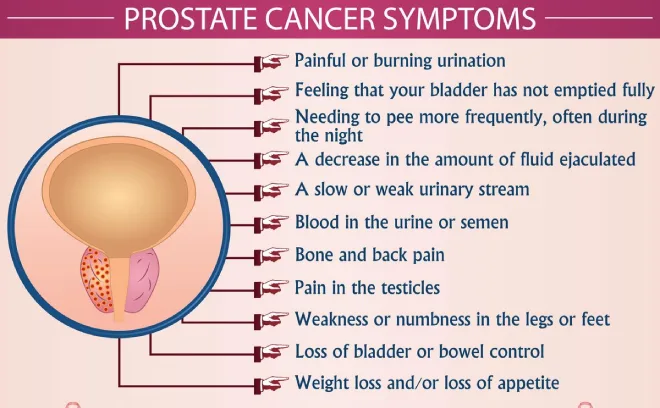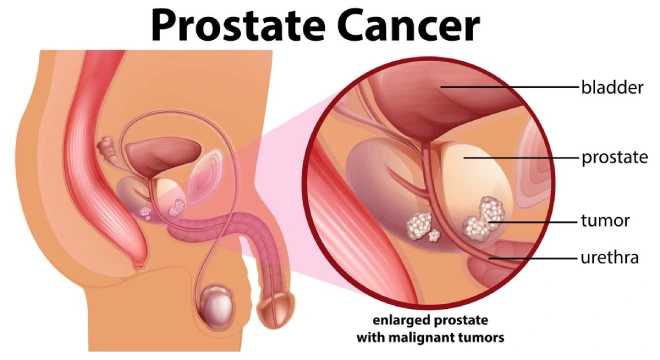Prostate cancer is a significant health concern for men worldwide, including in India. Individuals must clearly understand the disease and its various stages to make informed decisions about their health.
Stages of Prostate Cancer
Prostate cancer progresses through different stages, each indicating the extent and severity of the disease. The four primary stages of prostate cancer are:
-
Stage 1:
At this early stage, prostate cancer is confined to the prostate gland and is often small and localised. It has not spread beyond the prostate and can be difficult to detect without medical screening.
-
Stage 2:
In this stage, the tumour grows more prominent within the prostate gland but remains localised. It may be more easily detected through imaging tests or a digital rectal examination.
-
Stage 3:
The cancer extends beyond the prostate gland and may involve nearby tissues and organs, such as the seminal vesicles. However, it is still considered regionally contained and has not spread to distant parts of the body.
-
Stage 4:
Stage 4 prostate cancer is the most advanced and severe stage. The cancer has metastasised, spreading to distant organs or bones, such as the liver, lungs, or bones. This stage requires immediate and comprehensive medical attention.
Stage 4 Prostate Cancer: Symptoms and Progression

Individuals with stage 4 prostate cancer may experience various symptoms, varying from person to person. Common signs of advanced prostate cancer include:
- Persistent and severe pain in the lower back, hips, or pelvis.
- Difficulty urinating or experiencing a weak urine flow.
- Blood in the urine or semen.
- Erectile dysfunction or other sexual problems.
- Fatigue and unexplained weight loss.
It is crucial to recognise these symptoms and seek medical help promptly. Early detection and treatment can significantly impact the prognosis and quality of life for individuals with stage 4 prostate cancer.
Prostate Cancer Stage 4 Life Expectancy
The life expectancy for patients with stage 4 prostate cancer can vary depending on several factors, including the individual’s overall health, the cancer’s aggressiveness, and the response to treatment. While it is challenging to determine an exact life expectancy, advancements in medical treatments have improved survival rates for individuals with advanced prostate cancer.
Factors that may affect prognosis and survival rates include:
- Age: Younger patients tend to have better outcomes than older individuals.
- Overall health: Patients with good general health are more likely to tolerate aggressive treatments and have better survival rates.
- Spread of cancer: The extent of metastasis and the organs affected can impact life expectancy.
- Treatment response: The effectiveness of treatment options, such as chemotherapy, hormone therapy, targeted therapy, and immunotherapy, can influence outcomes.
Patients need to communicate openly with Dr. Bhushan Zade, Radiation Oncologist in Pune about their prognosis and treatment options to make informed decisions about their care.
Managing Pain in the Final Stage
Pain management significantly enhances the quality of life for individuals with stage 4 prostate cancer. Working closely with surgeons, including oncologists and pain specialists, is essential to develop a personalised pain management plan.
Techniques and strategies for effectively managing pain in stage 4 prostate cancer may include:
- Medications: Prescription pain medications, such as opioids, can provide relief. These should be used under oncologists’ guidance to manage pain effectively while minimising side effects.
- Palliative care focuses on relieving symptoms and improving patients’ overall well-being. It can include a range of interventions, such as physical therapy, acupuncture, and counselling.
- Complementary therapies: Some individuals find relief from pain through complementary therapies like massage, meditation, or yoga. It is essential to discuss these options with oncologists to ensure they are safe and appropriate.
Treatments for Stage 4 Prostate Cancer
Stage 4 prostate cancer requires aggressive and comprehensive treatment approaches. The goal of treatment is to slow the progression of the disease, relieve symptoms, and improve quality of life. Treatment options may include:
- Chemotherapy: Chemotherapy uses powerful drugs to kill cancer cells and shrink tumours. It is often combined with other treatments to target cancer cells throughout the body.
- Hormone therapy: Prostate cancer cells grow with male hormones like testosterone. Hormone therapy aims to reduce hormone levels or block their effects on cancer cells.
- Targeted therapy: Targeted therapies specifically target specific genetic or molecular abnormalities in cancer cells, disrupting their growth and survival.
- Immunotherapy: Immunotherapy harnesses the body’s immune system to recognise and attack cancer
cells. It can boost the immune response and help fight against cancer cells.
Individuals with stage 4 prostate cancer must work closely with their oncologists to determine the most appropriate treatment plan based on their specific conditions and needs. Treatment options may be tailored to the individual, considering factors such as overall health, the extent of metastasis, and personal preferences.
Lifestyle and Supportive Care
In addition to medical treatments, individuals with stage 4 prostate cancer can benefit from lifestyle modifications and supportive care measures to improve their overall well-being. Here are some tips:
- Maintain a healthy diet: Eating a balanced diet rich in fruits, vegetables, whole grains, and lean proteins can help support overall health and strengthen the immune system. Consult with a registered dietitian to create a personalised nutrition plan.
- Engage in regular exercise: Physical activity can help manage symptoms, maintain muscle strength, and improve mood. Consult with an oncologist before starting an exercise program to ensure it is safe and suitable for your condition.
- Seek emotional support: Dealing with stage 4 prostate cancer diagnosis can be emotionally challenging. Reach out to loved ones, join support groups, or consider speaking with a mental health professional who specialises in cancer-related issues.
- Manage stress: Stress can exacerbate symptoms and impact overall well-being. Incorporate stress reduction techniques into your daily routine, such as meditation, deep breathing exercises, or engaging in activities you enjoy.
- Stay informed: Educate yourself about prostate cancer, its treatments, and supportive care options. Stay up-to-date with the latest research and advancements in the field. Reliable sources such as reputable medical websites, respected cancer organisations, and peer-reviewed journals can provide valuable information.
- Communicate with your oncologists: Open and honest communication with your oncologists is crucial throughout your treatment journey. Keep them informed about any changes in symptoms, side effects, or concerns you may have. They can help address your needs and adjust your treatment plan accordingly.
Read More: Radiologist’s Role in Variations of Prostate Cancer Detection
Conclusion
Stage 4 prostate cancer represents an advanced and critical phase of the disease. While it may be daunting, it is essential to remember that treatment options are available to manage symptoms, slow disease progression, and improve quality of life.
By working closely with oncologists, maintaining a healthy lifestyle, seeking support, and staying informed, individuals with stage 4 prostate cancer can navigate their journey with greater confidence and resilience.

